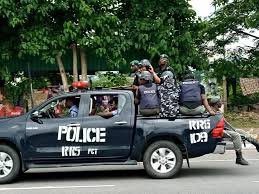Not too long ago, precisely in October this year a One Chance robber was lynched in Abuja, Nigeria’s capital city. He was a member of a syndicate which operated around the NYSC junction, along the Kubwa express way in Abuja. He met his waterloo on a fateful Tuesday morning.


Eyewitnesses said the suspect arrived the area around 2 am in a gulf car, in company of two others from the Dutsen-Alhaji junction, on the same express way. Luck ran out of him. But members of his gang escaped to continue their dastardly activity that has continued to swell the rank of the One Chance Gang in the city. Terror has returned to Abuja since the ember months. In and around the city the syndicate operates unleashing fears, maiming their victims after collecting their hard-earned income. It is against the backdrop of the worrying menace of this kind of crime Sultan Rabiu in this special report, takes a deep look into the modus operandi of the criminals and poses constructive questions to the police particularly, on addressing the crime.

Regarding the Kubwa robbery, the two other members escaped from the scene immediately their vehicle hit a road barrier.
A security guard with one of the filling stations in the area, Sulaiman Yunusa, said a stolen motorcycle being driven by one of the robbers, was recovered at the scene, before the vehicle was set ablaze by the mob.
He said one chance activities are becoming rampant along the express way, with some of them stealing goods from trucks parked along the road during the night hours.
But angry residents set fire on their abandoned vehicle.
What Is “One Chance”?
One Chance. This term refers to a dangerous and organised crime syndicate that poses as legitimate taxi services, preying on unsuspecting commuters. While many face the immediate loss of their belongings, the far-reaching consequences of One Chance—including psychological trauma and a growing sense of insecurity—are felt deeply by the people of Abuja. For many residents, especially women, stepping into a taxi has become a calculated risk. As the frequency of these crimes increases, so does the fear and unease that now characterise the city’s transportation system.
In Abuja, One Chance is the terrifying reality faced by many commuters who fall victim to cleverly disguised criminals posing as taxi drivers. These gangs, operating in well-coordinated teams, use vehicles that appear clean and legitimate, often blending seamlessly with the city’s bustling traffic.

The vehicles are frequently equipped with fake license plates, a ruse that makes it nearly impossible for the police to track them. Criminals exploit the passengers’ trust, knowing that the need for affordable transportation can often cloud judgment.
Once inside the vehicle, passengers are trapped. The doors are locked, and weapons—usually guns or knives—are brandished. Passengers are then coerced into handing over their valuables: phones, money, and sometimes even bank details for further exploitation.
Some victims have not only lost their belongings but have also been physically harmed. In the worst cases, victims are thrown out of moving vehicles, leading to serious injuries or even death.
The criminal gang’s tactics are calculated and exploit vulnerable moments: rush hour traffic, late-night commutes, or times when police presence is low.
This randomness of attacks has left Abuja residents with a pervasive sense of vulnerability and fear. In the quietest hours of the day, many wonder if they will be the next victim of this ever-growing menace.
A Victim Harrowing Encounter
For Miss Julliet, a young woman working in a lounge in Garki area of Abuja, the dangers of One Chance became terrifyingly real.
Three years ago, after a long shift, she boarded a red Golf car from Garki Area 11 to Bannex Junction, believing it to be a normal taxi. “I saw a man sitting in the front seat, but I didn’t think anything of it,” she recalls. “The vehicle had tinted windows, but it seemed harmless enough”, she stressed.
The horror began once she got inside. “He pulled out a gun and pointed it at me,” Julliet says, her voice trembling as she recounts the nightmare. “He told me not to scream, or he would kill me. At gunpoint, they forced me to unlock my phone.” The robbers transferred a sum of ₦90,000 from her bank account, but the terror didn’t stop there.
For hours, Julliet was driven around various streets, her fear mounting as she realised she was at the mercy of the criminals. “I was scared I was going to be kidnapped. The car was moving so smoothly through traffic, I didn’t think anyone would notice what was happening inside, ” she narrated.
Eventually, Julliet was let go on a quiet street, lucky to be alive but traumatised. A passerby helped her find her way home, but the scars of that night have stayed with her. “Every time I get into a taxi now, I’m on edge. I don’t feel safe anymore.”
Julliet is one of the fortunate ones to tell their stories. Many others are not so lucky.
On May 3, 2024, the residents of Abuja were shocked by the discovery of a young woman’s body found atop the Mpape Junction Bridge.
Her name was Kadoon Louisa Lomumbe, and she had been a victim of One Chance. Like many others, she had fallen prey to the deadly gang while on her way to work. The brutal nature of her death highlights the grave danger posed by these criminal syndicates.
The Broader Impact of “One Chance” Crimes
The effects of One Chance crimes ripple far beyond the immediate financial losses. The psychological trauma suffered by victims often lingers long after the physical harm has healed.
Many commuters who survive these harrowing experiences develop severe anxiety and PTSD, and a heightened sense of vulnerability can make even the simplest trips feel overwhelming. The broader community also feels the effects: a city once known for its vibrancy now grapples with a growing sense of insecurity.
Women, in particular, have been disproportionately affected
A tragic case that further underscores the dangers of One Chance was that of Na’imat Suleiman, a 28-year-old legislative aide who was abducted and murdered by One Chance criminals in October 2024. Despite a ransom being paid, Na’imat’s life was cut short, and her body was later discovered by the side of the road. This tragic loss only adds to the growing list of victims, highlighting the urgency of addressing the crime.
For many, avoiding One Chance has become a matter of survival. Women have been particularly cautious, often opting for more expensive ride-hailing services like Uber or Bolt.
However, this is not a luxury everyone can afford. For most residents, the daily commute remains a dangerous gamble.
The Challenges in Tackling “One Chance” Crimes
Tackling the growing problem of One Chance crimes in Abuja is far from simple. A combination of factors has allowed these criminal activities to flourish unchecked.
Underdeveloped Public Transport System: Abuja’s public transportation options are limited, with many residents depending on private cars that operate as taxis. This creates an easy opportunity for criminals to pose as legitimate drivers without raising suspicion.
Lack of Vehicle Tracking:
Without a comprehensive vehicle tracking system, it’s nearly impossible for authorities to trace criminals after a One Chance robbery has taken place. The criminals can switch between vehicles at will, making their operations more difficult to monitor and curb.
Inadequate Background Checks: There are no stringent checks on the individuals who operate as taxi drivers, leaving room for criminals to exploit the system.
Limited Police Presence: In high-risk areas, police patrols are few and far between, providing criminals with an easy escape route.
These factors have created a perfect storm for One Chance to thrive in Abuja, and they underscore the urgent need for both government action and community involvement to address the issue.
Community Awareness: A Key to Prevention
While government intervention and law enforcement are crucial, the involvement of the community is also vital. Residents can play an active role in protecting themselves and others by staying informed and vigilant.
Dr. Kabir Adamu, Managing Director of Beacon Consulting Limited, emphasises the importance of awareness. “Commuters need to understand the motives behind One Chance attacks,” he explains. “Beyond financial gain, there are cases where victims are abducted for ritual purposes. Recognising these threats is the first step in preventing them.”
Security consultant, Chigozie Ubani also stresses the importance of staying alert. “These criminals use various types of vehicles, from 14-seater buses to minivans, and often operate outside designated taxi parks. It’s crucial that commuters avoid these vehicles and only board registered taxis,” Ubani said.
Experts also advocate for community initiatives like workshops, where residents can learn to spot dangerous vehicles and report suspicious activities. Through these efforts, the community can help create an environment of vigilance, making it harder for criminals to operate undetected.
Government and Technological Solutions
The Nigerian government has recognised the growing threat posed by One Chance and has taken steps to address it.
Recently, the Minister of the Federal Capital Territory (FCT), Nyesom Wike has proposed the construction of world-class bus and taxi terminals in key areas, which will help streamline transportation and reduce the opportunities for criminal gangs to operate.
The CEO of Sure Switch Tech, Ugbah Chukwuma has launched the Sure Drivers app, which uses advanced technology such as QR codes and AI-powered emergency response systems to help commuters stay safe.
Speaking recently in Abuja, Chukwuma explained that the app allows users to report suspicious activities in real-time, helping law enforcement respond quickly. “By harnessing the power of technology, we can make transportation safer for everyone,” he said.
The threat of One Chance crimes in Abuja is a life-threatening problem that demands immediate action. A coordinated effort between the government, law enforcement, and the community is necessary to tackle this menace. With stronger regulations, improved security measures, and greater community awareness, it is possible to make Abuja a safer place for all residents. Until then, commuters will continue to face the harsh realities of a system where a single ride can turn into their worst nightmare.


Attempts to speak with the FCT Police Command spokesperson, SP Josephine Adeh by our correspondent proved futile.



